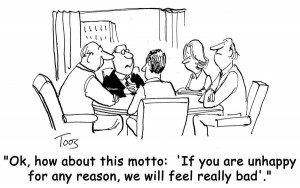 I wrote earlier this week about the PR firm of the future. Clearly, it isn’t all worked out yet, but I do think the days of people sitting in offices from 9-5 (or 8-6 or 7-7) will soon be extinct.
I wrote earlier this week about the PR firm of the future. Clearly, it isn’t all worked out yet, but I do think the days of people sitting in offices from 9-5 (or 8-6 or 7-7) will soon be extinct.
As I do when I’m working out a new idea, I looked at it first from the perspective of an employee and whether or not the virtual company gives us a competitive advantage. Is it an added benefit most firms can’t yet offer?
But what about as an employer? And what about the client service issue, from a professional services firm perspective?
How might our clients feel about working with people who may not be full-time and may not live in North America? How might they feel about not ever meeting the team who does the work, relying instead on their account team lead?
Non-Traditional Work Hours
Danny Brown commented on that post by saying we should take a page from start-ups and let people work when they want. Meaning, if they can get their work done in two 15-hour days and take the rest of the week off, so be it.
I joked I wished I could do that (maybe there is some truth to it), but when push comes to shove, we are a client service organization, which means we need to be “on” when our clients are.
So we have a virtual organization and, in fact have a contest that requires my team to get up and away from their desks – gasp! – during the middle of the day, but people still work normal business hours.
Heck, they may work even longer. I know Lindsay Bell starts her day around 5:30 or 6:00 a.m., but she’s also the very best I’ve ever seen at shutting it down and not coming back to it until the next morning.
But she’s a full-time employee and she’s (for lack of a better term) required to work every day.
The Client Service Issue
Here’s the other thing I struggle with: If people aren’t full-time or they work two 15-hour days (or three 12-hour or whatever works), who becomes the client facing person? Because I’m here to tell you, clients don’t care if you only work three days a week. If they have a challenge or issue at midnight on Saturday night, they’re calling you.
What I’m really afraid will happen is I become the face to all clients, which isn’t scalable…and, really, isn’t where I should be spending my time if I want to grow an organization.
Of course, now that I type this (and think out loud), I realize there are different incentives and different pay structures for those who work more traditional hours than those who do not.
But we’re not a start-up that is creating products or widgets or technology or software to sell. We sell our time so I think we have to work more traditional hours…at least until our clients begin to make the shift.
As Things Evolve, Provide Flexibility
As you can see, it’s not fully baked. Things continue to evolve and none of us really have any idea where it’s going to go.
What we do know is most Millennials (and some Gen Xers and Baby Boomers) want the flexibility to work from home, go to their family’s events, use the technology they prefer, and work the hours that fit their personalities.
I know when I worked for someone, if I hadn’t had to be in the office by 8:30 a.m. and had the flexibility to work the morning hours from home and then stay later than 5:30 each day, I would have kissed my boss.
Sometimes that flexibility is more important than money or benefits or retirement funds or team parties or catered lunches.
We don’t truly know what the PR firm of the future will look like or how we’ll “fix” the client service issue if everyone wants to work less than five days a week, but we do know it’s evolving and we should be considering flexibility now.